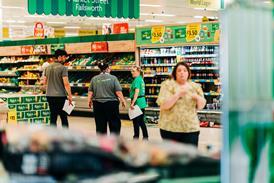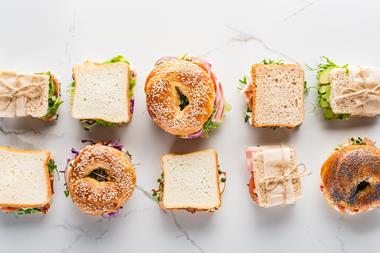an advertising supplement
Howdy, partners...
Brokerage in Britain has its origins in the early Sixties, when Desmond Cracknell and his company Food Brokers Ltd first emerged, modeled on similar, successful operations in the US.
At the time, it was an efficient way to make money by spreading sales costs across various manufacturers' products. Food Brokers was responsible for introducing and growing many major toiletry and grocery brands from Plax to Pringles and it was soon joined by others, such as the Suffolk-based Robinson Young, now a brokerage giant about to celebrate its thirtieth anniversary.
Three decades on and the marketplace has changed dramatically. So too have brokers. Now they prefer to be seen as brand buddies rather than 10% men, but given economic globalisation and e-trading, why should customers pay what is still essentially a middleman when they can go straight to the producer?
Globalisation may, in fact, be a cloud with a silver lining as long as brokers can adapt to changing circumstances, according to Joe Sloan, chairman of SHS Group.
"Global brands will increasingly need specialist servicing, particularly in the non-multiple sectors... the emergence of pan-European brands offers opportunities for further expansion," says Sloan.
The number of global brands is, in any case, still relatively small. Any regular traveller knows that brands which are huge in Germany or Spain might be marginal or completely unknown in Britain. For these, it's still not economical to support a sales force in every world territory, so brokers have an increasing part to play in enabling companies to penetrate more markets and attain worldwide distribution.
But the whole grocery brokerage business might be heading for major consolidation. In the US, brokerage companies once worked within their own state territories; now just two or three mega-brokers operate nationwide and some may even have global ambitions. Could the same happen in Europe? Possibly.
"Only marriages are made in heaven," says Bob Keefe, managing director of Jenks Sales Brokers. "Productive long-term business partnerships are hard to find. For any multinational the need to identify potential partners is a real stumbling block to expansion. Western Europe, to many major companies, is a very large picnic on a very small blanket and they would no doubt prefer to be working with a cross border partner to ease communication, simplify logistics and inevitably cut costs."
Globalisation and consolidation might be pulling us towards the creation of ever larger business entities but at the other end of the scale, the food scares of recent years may lead to an increased demand for food which has been locally sourced. The new food brokers may have a role to play here, too.
Companies such as the Berkshire-based Product Chain Ltd are working to develop retailers' understanding and approach to local sourcing, especially within the growing organic sector.
"People are sick and tired of homogenous products when there are terrific foods available from small producers in all kinds of different geographical areas," says Simon Dunn, md of Product Chain which represents a number of niche producers, including Organic Biyo producer, Tim's Dairy. "There's a serious consumer backlash operating in the wake of the foot and mouth outbreak."
Dunn claims that companies like his are far better placed to source individual, characterful products from the regions and supply them to the major multiples. "We know who has the capacity to supply them and who doesn't," he says. "Big quoted companies are under pressure from their shareholders to stay profitable. They can't allocate the time to search for new local sources. We tell them not to try to let us do it for them."
Bob Keefe agrees with Dunn about brokers' role in understanding and handling local markets. "Each European market has a different culture, very different consumer attitudes, despite increasing internationalisation and differing retail delivery. Most manufacturers choose their partner on a mix of measures. But crucial amongst them is cultural fit... someone [who] will make it work. They will focus on their core values and implement them locally."
While smaller producers have trouble getting noticed by larger retailers, the cash and carry sector struggles for recognition from some major suppliers. Michael Robinson, md of Robinson Young, says brokers are vital to their survival.
"With the exception of the largest multi-national manufacturers, very few brand owners or producers are able to provide the level of branch service that is an essential part of the support that the C&C sector will need to remain competitive," he says.
Some traditional grocery brokers have met the challenge of the new economy by diversifying into new areas. For example, Food Brokers Ltd has formed a specialist telecoms division to supply a range of mobile phones, phone cards and top-up solutions to UK retailers.
"We were approached a few years ago by Orange to introduce the new pre-paid mobile phone vouchers concept to the grocery and impulse sectors as they had no experience themselves and their distributors only had experience of electrical retailers," says chairman Victor Cracknell. "We quickly realised the market growth potential and that we needed to work with all four networks to provide a "one stop" service to the trade."
There's also movement away from the traditional food brokerage operation towards a consultancy-style role variously described as the food partner or brand partner. Euro Food Brands is one example of this type of company, acting as a marketing arm for major European brands in the UK, supplying multiples, restaurants and takeaways and offering its own branded products from factories on the continent.
But it's not just the newer kids on the block that are moving away from traditional models. Cheltenham-based SHS Group in business for some 26 years is also seeking to distance itself from the old language of brokerage. "The term broker does nothing to enhance the image of our industry as it tends to convey a middle man buying and selling and taking a discount along the way," says chairman Joe Sloan. "We are primarily involved in distribution, sales and marketing. Retailers understand that we are not an extra cost but actually add value to their business as well as operating profitably for the principals."
Victor Cracknell agrees. "Brokerage should become a natural extension to a manufacturer's own operation. We find it works best when a client realises we can bring added value to their own operation and sees us as a genuine partner in building brands."
There seems little reason to believe that brokerage is about to share the fate of the dinosaur. Extinction is always the result of a failure to adapt and as long as traditional firms can find ways to respond to a changing environment, their survival is assured.
{{Z SUPPLEMENTS }}
Close menu
- Home
- Retail & Wholesale
-
Products & Suppliers
- Back to parent navigation item
- Products & Suppliers
-
Product Categories:
- Back to parent navigation item
- Product Categories:
- Alcoholic drinks
- Bakery
- Cereals & breakfast
- Cheese
- Chicken & poultry
- Chocolate
- Confectionery
- Crisps, nuts & snacks
- Dairy
- Fish
- Fresh produce
- Frozen
- Household
- Meat
- Own Label
- Sauces & condiments
- Seasonal
- Soft drinks
- Vaping
- Vegan & plant-based
- World foods
- Suppliers
- People
- Reports & Data
-
Topics A-Z
- Back to parent navigation item
- Topics A-Z
-
Popular topics:
- Back to parent navigation item
- Popular topics:
- Cost of living crisis
- Crime
- Deposit Return Schemes
- Finance
- Government & Regulation
- Health
- Inflation
- Loyalty
- Marketing
- Mergers & Acquisitions
- New Product Development
- Sourcing
- Supply chain
- Sustainability & environment
- Technology
- Ultra Processed Foods
- Vaping
- A-Z all topics
- Content by type:
- Events
- Subscribe now
Sign in to comment on this article
Not logged in before? Register for FREE guest access today.
You will be able to:
- Read more stories
- Receive daily newsletters
- Comment on stories
Advert















No comments yet